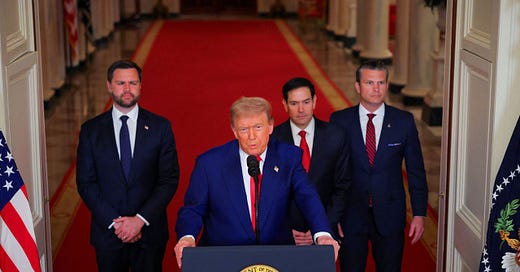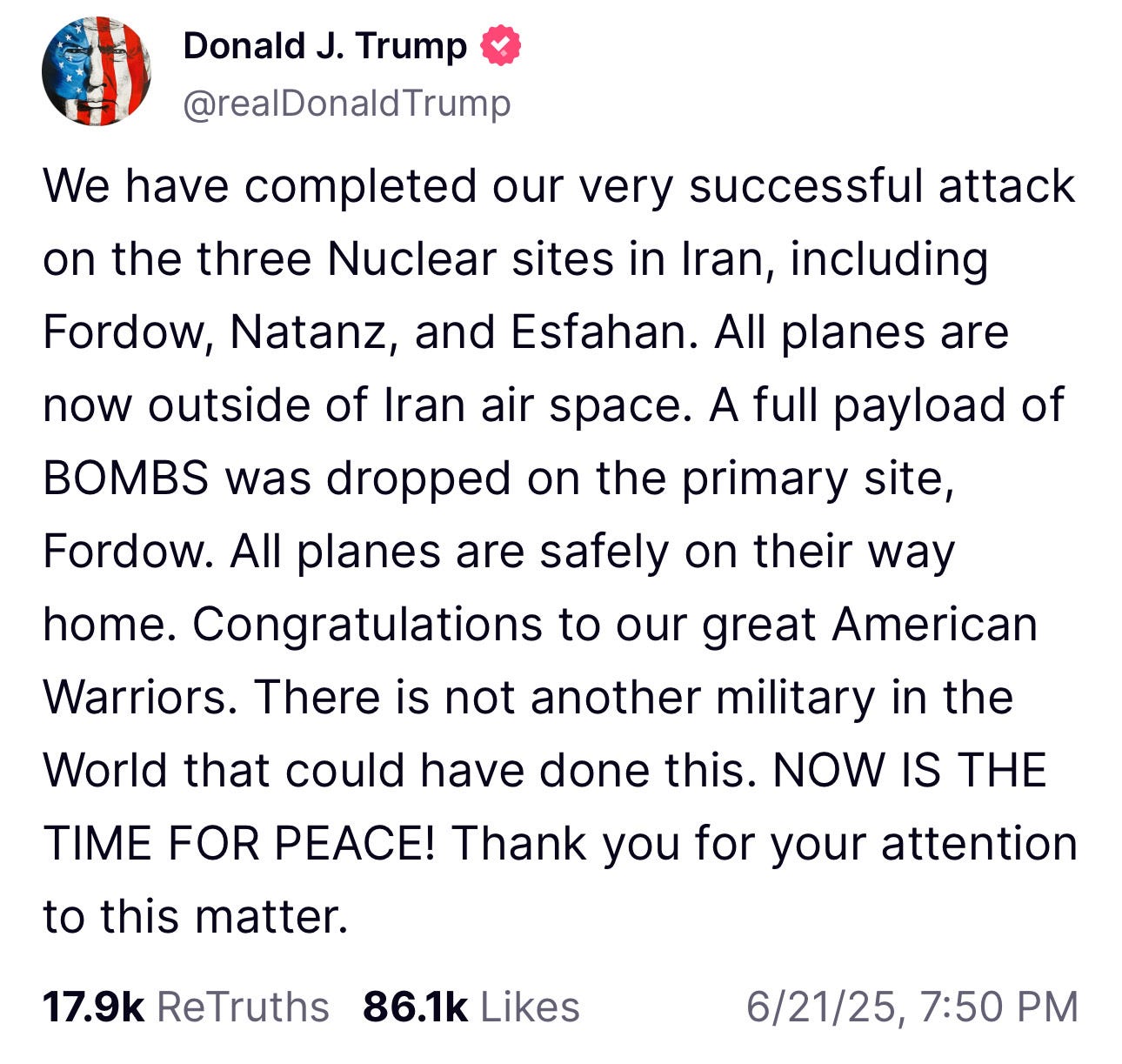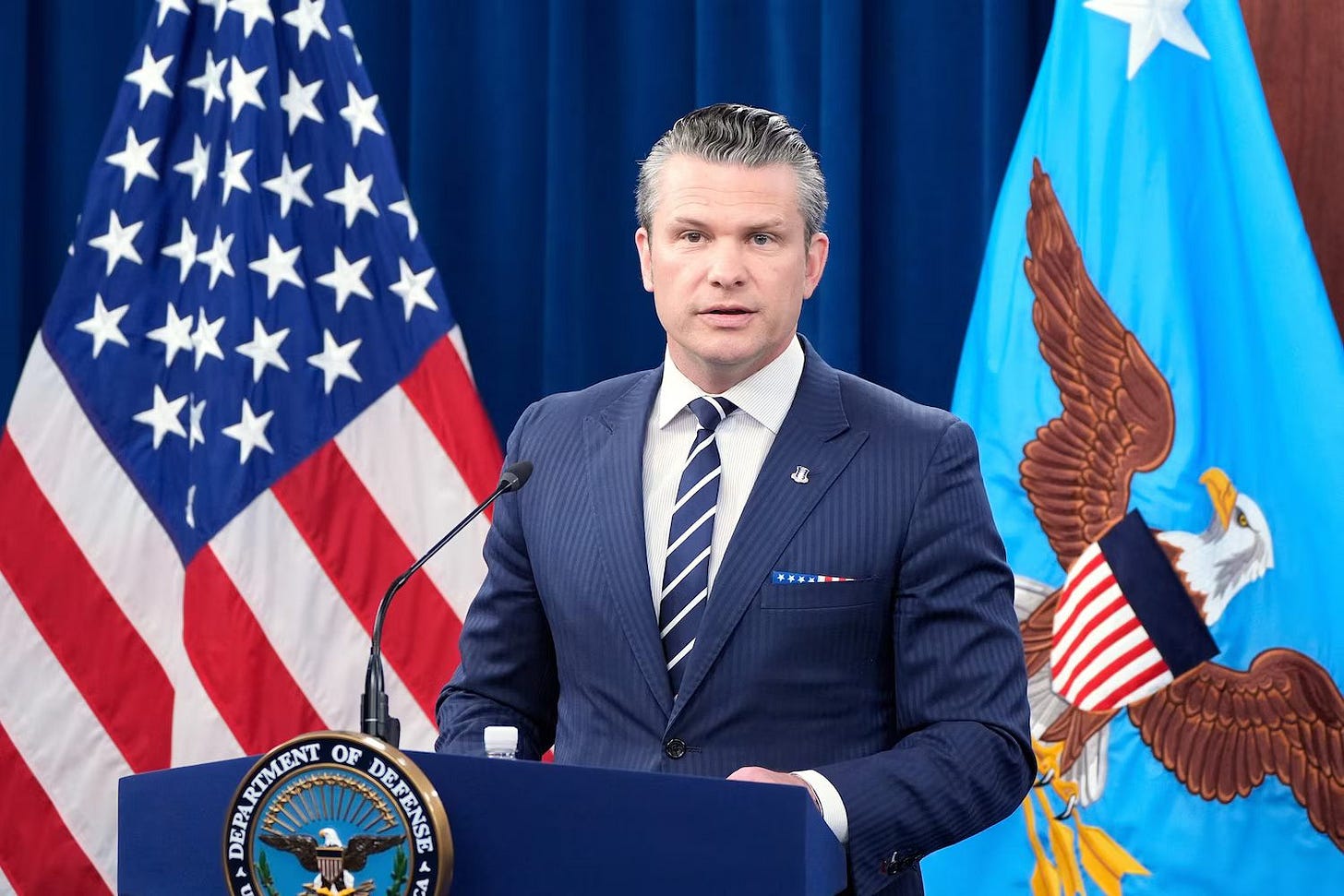Trump Week 22, Continued: Military Strikes, Visa Policy Changes, and Court Rulings
Military action, visa updates, and legal challenges end a turbulent week for the Trump administration.
Trump’s 22nd week concluded with U.S. military action in Iran, new immigration directives, and key federal court rulings. Amid rising tensions between Iran and Israel, the United States launched airstrikes on Iranian targets, marking a significant escalation in regional conflict and introducing new uncertainty to a volatile situation.
In immigration, the Trump administration resumed processing foreign student visas with a new requirement: applicants must now submit their social media account information. As previously reported by The Introspective, the State Department had temporarily halted visa interviews to expand these screenings. Meanwhile, in California, a federal appeals court blocked a lower court order that would have returned control of the state’s National Guard to Gov. Gavin Newsom, following protests against immigration raids.
As The Introspective previously reported, Palestinian activist Mahmoud Khalil—who was arrested in March—was released after a federal judge ordered his release. That same day, in an ongoing legal battle between Harvard University and the Trump administration, a judge temporarily blocked efforts to revoke Harvard’s ability to enroll international students.
Iran
The United States launched airstrikes on nuclear sites in Iran, directly involving the country in the Iran-Israel war.
“We have completed our very successful attack on the three nuclear sites in Iran, including Fordow, Natanz, and Esfahan. All planes are now outside of Iranian airspace. A full payload of BOMBS was dropped on the primary site, Fordow,” President Trump announced in a Truth Social post.
“All planes are safely on their way home. Congratulations to our great American warriors. There is not another military in the world that could have done this. NOW IS THE TIME FOR PEACE! Thank you for your attention to this matter.”
In a Saturday night address to the nation, Trump further warned Iran to pursue a peace deal with Israel.
“There will be either peace, or there will be tragedy for Iran far greater than we have witnessed over the last eight days,” he said.
“Remember, there are many targets left.”
At a briefing, Defense Secretary Pete Hegseth said planning for the strike took "months and weeks."
“It took a great deal of precision. It involved misdirection and the highest level of operational security. B-2s went in and out of downtown Tehran— not Tehran, excuse me—up to these nuclear sites and back without the world knowing at all,” Hegseth said, referring to the B-2 Spirit bombers used in the strike.
“In that way, it was historic—the strike included the longest B-2 Spirit bomber mission since 2001. And the first operational employment of the MOP, a Massive Ordnance Penetrator. The mission demonstrated to the world the level of joint and allied integration that speaks to the strength of our alliance and our Joint Forces. As President Trump has stated, the United States does not seek war. But let me be clear: we will act swiftly and decisively when our people, our partners, or our interests are threatened.”
Many reacted to U.S. involvement in Iran, including Israeli Prime Minister Benjamin Netanyahu, who praised Trump in a post on X.
“President Trump and I often say peace through strength. First comes strength, then comes peace. And tonight, President Trump and the United States acted with a lot of strength,” Netanyahu said.
Iranian Foreign Minister Abbas Araghchi called the strikes a “grave violation.”
“The events this morning are outrageous and will have everlasting consequences,” Araghchi wrote on X.
“Each and every member of the UN must be alarmed over this extremely dangerous, lawless, and criminal behavior.”
Within Congress, reactions to the strikes were mixed.
Sen. Lindsey Graham called the attack “the right call.”
“The regime deserves it. Well done, President @realDonaldTrump,” he wrote on X.
“To my fellow citizens: We have the best Air Force in the world. It makes me so proud.”
Rep. Rick Crawford issued a statement saying he was monitoring the situation closely.
“As I have said multiple times recently, I regret that Iran has brought the world to this point. That said, I am thankful President Trump understood that the red line—articulated by presidents of both parties for decades—was real,” he said.
Criticism of the airstrikes was swift from other lawmakers.
House Minority Leader Hakeem Jeffries said Trump “misled the country.”
“Donald Trump promised to bring peace to the Middle East. He has failed to deliver on that promise. The risk of war has now dramatically increased, and I pray for the safety of our troops in the region who have been put in harm's way,” he said in a statement.
Rep. Thomas Massie posted on X: “This is not constitutional,” criticizing the president for conducting the strikes without congressional approval.
Rep. Alexandria Ocasio-Cortez (AOC) said the strike constituted grounds for impeachment.
“The president's disastrous decision to bomb Iran without authorization is a grave violation of the Constitution and congressional war powers,” she wrote on X.
“He has impulsively risked launching a war that may ensnare us for generations. It is absolutely and clearly grounds for impeachment.”
Immigration and California
As anti-immigrant sentiment continues to raise tensions, the State Department has restarted the process for issuing student visas to foreign nationals—but now requires a review of applicants’ social media accounts. A previous report from The Introspective highlighted the department’s earlier pause on visa interviews to expand these screenings.
“We use all available information in our visa screening and vetting to identify visa applicants who are inadmissible to the United States, including those who pose a threat to U.S. national security,” the State Department said in a press release, adding that visa applicants must now make their social media accounts “public.”
“Under new guidance, we will conduct a comprehensive and thorough vetting, including online presence, of all student and exchange visitor applicants in the F, M, and J nonimmigrant classifications.”
Meanwhile, following protests in California against Immigration and Customs Enforcement (ICE) raids, a federal appeals court ruled that President Trump can retain control of the National Guard, blocking a previous order that would have returned authority to California Gov. Gavin Newsom.
“Under longstanding precedent ... our review of that decision must be highly deferential,” the ruling stated.
“Affording the president that deference, we conclude that it is likely that the president lawfully exercised his statutory authority.”
“Our conclusion that it is likely that the president’s order federalizing members of the California National Guard was authorized,” it continued.
President Trump celebrated the ruling on Truth Social, calling it a “BIG WIN ... on the President’s core power.”
“This is a great decision for our country, and we will continue to protect and defend law-abiding Americans. Congratulations to the Ninth Circuit—America is proud of you tonight!” he wrote.
In a statement, Gov. Newsom said he was “disappointed” by the court’s decision.
“The court rightly rejected Trump’s claim that he can do whatever he wants with the National Guard and not have to explain himself to a court,” Newsom said.
“The president is not a king and is not above the law. We will press forward with our challenge to President Trump’s authoritarian use of U.S. military soldiers against citizens.”
Mahmoud Khalil and Harvard University
Following previous Introspective reports highlighting the March arrest of Palestinian activist and U.S. permanent resident Mahmoud Khalil, a federal judge ordered his release on Friday—three months after he was detained for his involvement in protests at Columbia University supporting Palestine.
“Trump and his administration, they chose the wrong person for this,” Khalil said.
“That doesn’t mean that there is a right person for this. There’s no right person who should be detained for actually protesting a genocide, for protesting their university, Columbia University.”
In a statement released by the American Civil Liberties Union (ACLU), Dr. Noor Abdalla, Khalil’s wife, said she “can finally breathe a sigh of relief and know that Mahmoud is on his way home to me and Deen, who never should have been separated from his father.”
“We know this ruling does not begin to address the injustices the Trump administration has brought upon our family, and so many others the government is trying to silence for speaking out against Israel’s ongoing genocide against Palestinians,” Abdalla wrote.
In a post on X, Assistant Homeland Security Secretary Tricia McLaughlin claimed the judge went “rogue” and had no authority to release Khalil.
“This is yet another example of how out-of-control members of the judicial branch are undermining national security,” McLaughlin wrote.
“Their conduct not only denies the result of the 2024 election—it also does great harm to our constitutional system by undermining public confidence in the courts.”
Meanwhile, as tensions between the Trump administration and Harvard University continue, a federal judge has extended a block on the administration’s efforts to revoke Harvard’s ability to enroll international students.
In a report by The Harvard Crimson, the university acknowledged the ruling and called it “warranted.”
“Given the government’s pattern of behavior thus far and the chaos it has inflicted, this surety is more than warranted,” the university wrote.
Harvard filed a lawsuit against the Trump administration in April after billions in grant funding were pulled over allegations of antisemitism-despite no evidence being provided.








